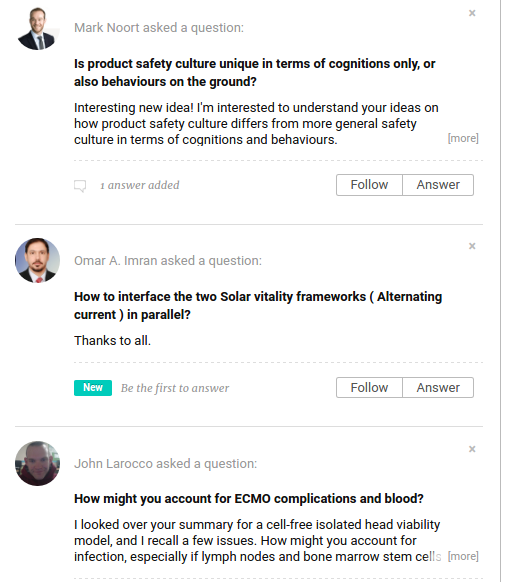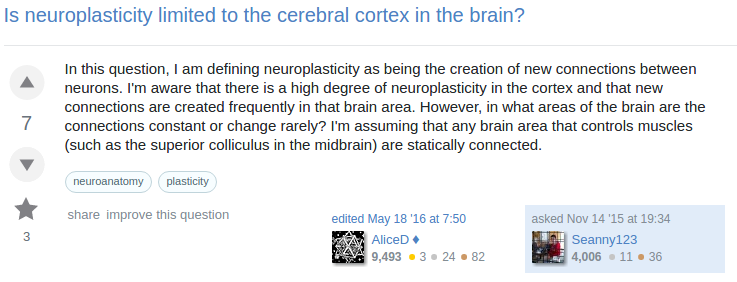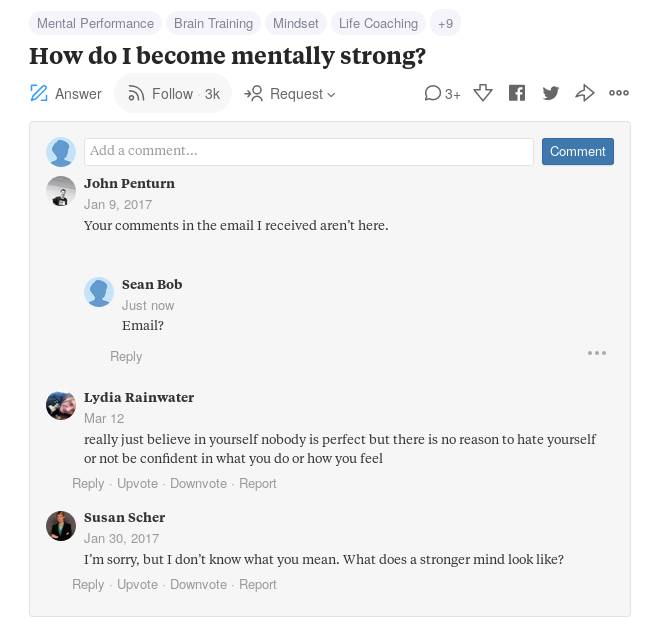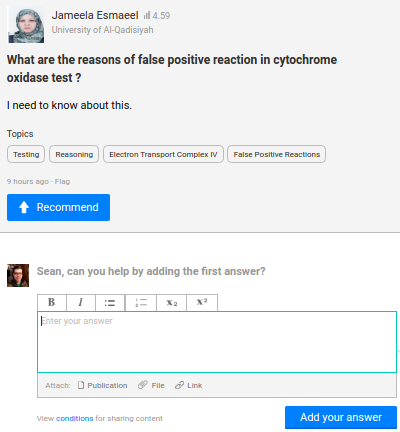Voyageur Technologique
Why StackExchange is superior to Quora and ResearchGate
[epistemic status: exasperated rant trying to disguise itself as a persuasive essay]
If you want to get a question publically answered by a fellow professional in an academic domain (physics, biology, neuroscience, psychology… etc.), you have a few options:
- Research Gate
- Quora
- StackExchange
They all share a common goal. You go there to get your question answered by other people. However, they pursue this goal in different ways.
Let’s look at what questions you can find on those sites. First, StackExchange:

We have questions sorted by tags and votes. Off-topic or poorly asked questions are on hold waiting for clarification from the question poster.
Second, Research Gate:

Two really vague questions and one well-phrased. Not bad.
Lastly, here’s Quora:

One vague question, two questions asking for general advice and no indication of the quality of the questions.
Why are there such different distributions in question quality across different sites? There are a number of features StackExchange does much better than ResearchGate and Quora allowing good questions to flourish. Below, I’ll contrast the approaches to curation, source authority, answer ownership, discussion management, and most importantly, their overarching mission.
Curation
A StackExchange site is driven by it’s users who decide what questions should be allowed and how they are improved.
Questions are filtered based on the scope of the site. For example, the scope of psychology.stackexchange.com is essentially:
- Questions about Cognitive Science, Psychology and Neuroscience.
- Constructive questions striving for objectivity.
- When objectivity is not possible, questions should encourage short, referenced answers describing “why” and “how”.
Questions falling outside this scope are flagged and closed by experienced users. There is no official team for dealing with reports and flags. All users with a certain amount of reputation Reputation is an indication of community trust and is earned from questions, answers and edits. can participate in the process. Disputes between users are resolved by moderators who are elected during annual elections.
Questions not filtered are assessed in the form of voting and are improved by suggesting edits. The question asker can then see the edits and approve them. However, the community as a whole decides whether edits are needed or not, allowing the prevention of a misguided question asker driving their question into the ground.
On a StackExchange site, you’re part of the team building a library of knowledge for the future and are given responsibility in accordance with this goal.
Quora is more focused on the individual. There is very little to guide what makes a good question. Quora does have the ability to flag and edit, but these are all hidden. Edits are fielded by the question asker and flags by Quora’s moderation team.
At Quora, you’re an individual on a site who’s direction is ultimately decided by those who own it, not the users.
Research Gate has none of these curation features, except for a bare-minimum reporting function. Down-votes don’t even exist, edits cannot be suggested and there is no philosophy about what makes a good question. At Research Gate, you’re there because you’re there?
Quality of answer over authority of source
On StackExchange, the reputation and name of the person are at the bottom of the question or answer. Editors are featured as prominently as askers.

Quora not only encourages you to enter credentials during the on-boarding process, it insists on shoving them in your face before you can read the question or even see how much it was upvoted.

Naturally, coming from Academia, Research Gate falls for the same credential dependence trap.

You own your answer
On StackExchange, questions and answers are licensed under a Creative Commons Attribution Sharealike license. Quora takes a more restrictive approach and does not seem to even require attribution. More worryingly, they block web-crawlers, including the Internet Archive. I couldn’t even find the ResearchGate Q&A policy in their copyright statement, so I’m assuming they own all content you create.
Separate avenues for discussion and answers
Ideally, a StackExchange thread contains a question and multiple answers ranked by quality. Sometimes it has comments, which can also be upvoted. However, these are not incentivised with reputation, unlike answers and questions. You can think of them as sticky notes to be removed and incorporated into the question. If those comments get unwieldy, chat rooms are available on each site for brief, low-latency discussion. If you want to discuss the direction of the site itself, there’s a “meta” site. For example, if you want to discuss whether Freud should be on-topic for psychology.stackexchange.com, you post in psychology.meta.stackexchange.com.
With Quora, the comments are hidden by default underneath a speech bubble icon and are nested. That means there’s a whole other discussion going on here to be sucked into, when all I wanted was an answer.

Research Gate takes the opposite position and allows for no feedback for questions to help with clarification.

Purposeful Mission
StackExchange science-related sites have the single purpose of getting “expert answers to advanced questions” in the defined field and is very explicit about it’s scope as the intersection between existing services:

ResearchGate is a little more awkward. Their mission is “connect the world of science and make research open to all.” But their execution is somewhat closer to what would happen if LinkedIn, Discourse, Google Reader and Academia were inbred for several generations.
Quora is “a place to share knowledge” to “understand the world and the people in it”. This seems to equally describe my local pub, given there are no stated constraints on what knowledge is being shared or the people I’m meeting. A more accurate description would be a walled-garden competitor to Medium (reading from inspiring people), Twitter (a personalized feed) and Yahoo Answers (bringing people together to answer poorly worded and excessively subjective questions).
Although they share similar goals, StackExchange is significantly more purposeful and focused than Quora and ResearchGate. StackExchange’s focus on it’s core mission translates into community tools lacking from it’s competitors. Thus, you should run, don’t walk, away from Research Gate and Quora. Come to StackExchange if you want. At the very least, if you’re dedicated to those platforms, make your voice heard to help make them better. The ideas I’ve mentioned above aren’t patented and can be adopted!
If you liked this post on community building, consider joining my mailing list to get updated about meditations on communities.